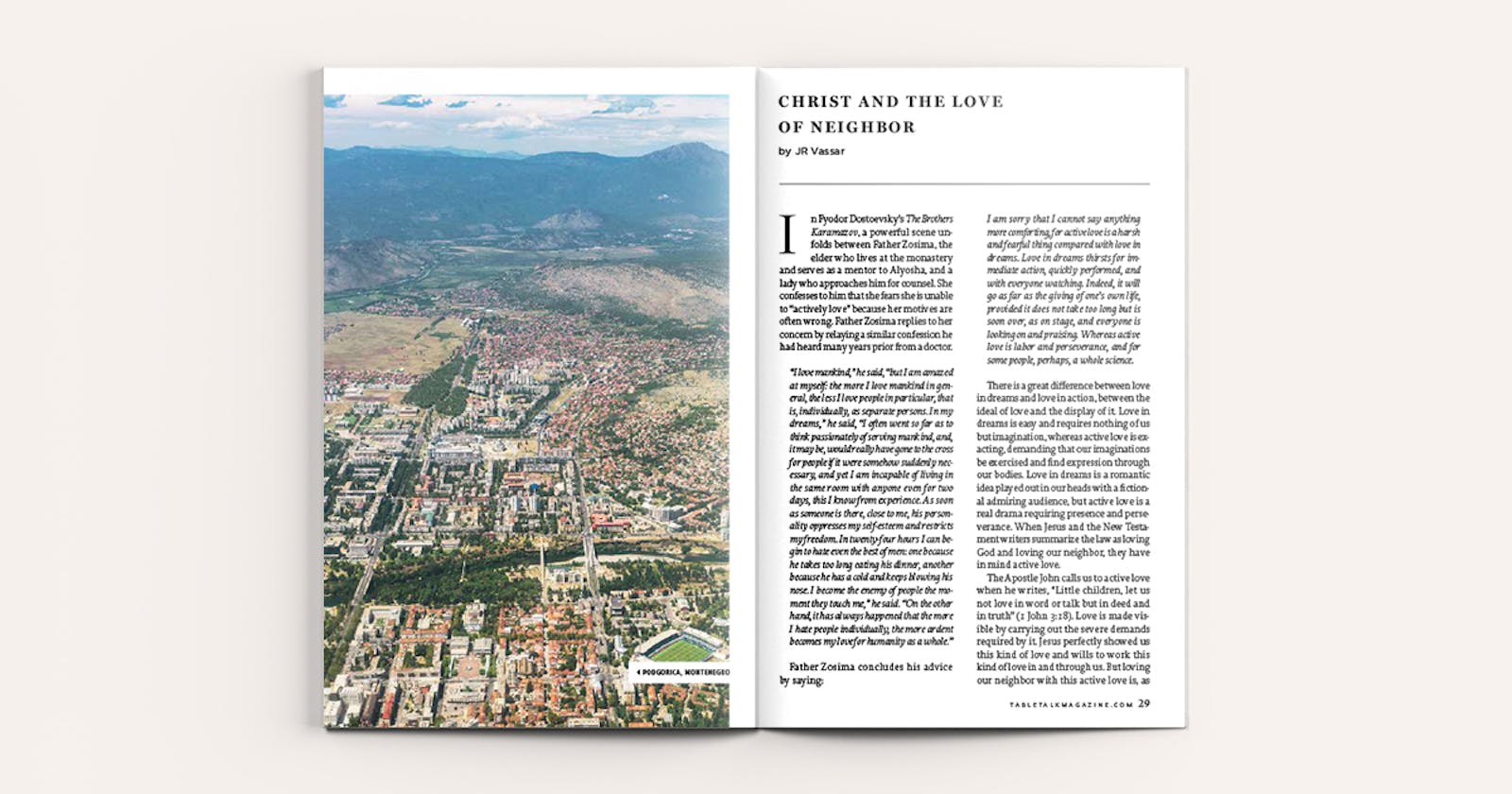
Request your free, three-month trial to Tabletalk magazine. You’ll receive the print issue monthly and gain immediate digital access to decades of archives. This trial is risk-free. No credit card required.
Try Tabletalk NowAlready receive Tabletalk magazine every month?
Verify your email address to gain unlimited access.
In Fyodor Dostoevsky’s The Brothers Karamazov, a powerful scene unfolds between Father Zosima, the elder who lives at the monastery and serves as a mentor to Alyosha, and a lady who approaches him for counsel. She confesses to him that she fears she is unable to “actively love” because her motives are often wrong. Father Zosima replies to her concern by relaying a similar confession he had heard many years prior from a doctor.
“I love mankind,” he said, “but I am amazed at myself: the more I love mankind in general, the less I love people in particular, that is, individually, as separate persons. In my dreams,” he said, “I often went so far as to think passionately of serving mankind, and, it may be, would really have gone to the cross for people if it were somehow suddenly necessary, and yet I am incapable of living in the same room with anyone even for two days, this I know from experience. As soon as someone is there, close to me, his personality oppresses my self-esteem and restricts my freedom. In twenty-four hours I can begin to hate even the best of men: one because he takes too long eating his dinner, another because he has a cold and keeps blowing his nose. I become the enemy of people the moment they touch me,” he said. “On the other hand, it has always happened that the more I hate people individually, the more ardent becomes my love for humanity as a whole.”
Father Zosima concludes his advice by saying:
I am sorry that I cannot say anything more comforting, for active love is a harsh and fearful thing compared with love in dreams. Love in dreams thirsts for immediate action, quickly performed, and with everyone watching. Indeed, it will go as far as the giving of one’s own life, provided it does not take too long but is soon over, as on stage, and everyone is looking on and praising. Whereas active love is labor and perseverance, and for some people, perhaps, a whole science.
There is a great difference between love in dreams and love in action, between the ideal of love and the display of it. Love in dreams is easy and requires nothing of us but imagination, whereas active love is exacting, demanding that our imaginations be exercised and find expression through our bodies. Love in dreams is a romantic idea played out in our heads with a fictional admiring audience, but active love is a real drama requiring presence and perseverance. When Jesus and the New Testament writers summarize the law as loving God and loving our neighbor, they have in mind active love.
The Apostle John calls us to active love when he writes, “Little children, let us not love in word or talk but in deed and in truth” (1 John 3:18). Love is made visible by carrying out the severe demands required by it. Jesus perfectly showed us this kind of love and wills to work this kind of love in and through us. But loving our neighbor with this active love is, as Father Zosima says, “a harsh and fearful thing,” and will require the help of the Holy Spirit.
Active Love is Specific
Jesus did not merely love people generally and from a distance. He loved people personally and up close. His love was not a vague feeling for the masses but a tangible love directed at particular people. He loved His family, submitting to His earthly parents as He grew up under their authority (Luke 2:51). He showed love for His mother in His dying moments by entrusting her well-being to His friend and disciple John (John 19:26–27). Jesus loved His disciples to the very end, even as they manifested hard hearts, slow minds, and weak characters. He loved His enemies, not faceless foes in distant lands, but people in the neighborhood who viciously opposed Him, slandered Him, and violently rejected Him (Luke 4:16–30). Jesus loved people with names, stories, and specific needs. He sought to know those names, enter those stories, and meet those needs. He healed a friend’s mother-in-law (Mark 1:29–31). In pity, He touched and cleansed a leper. He fed the hungry, healed the sick, gave sight to the blind, set the oppressed free, and taught the crowds who were like sheep without a shepherd.
Love in dreams doesn’t require one to actually enter the life and pain of another. But active love is tangible in its expression. It is directed at real people and seeks to alleviate real needs. It requires us to move beyond feeling for the faceless and nameless and to embrace the other, knowing them, hearing them, and helping them.
Active Love Is Sacrificial
The contemporary self is unabashedly committed to “expressive individualism.” This cultural dogma believes that the truly happy person is the one who is unencumbered, free to pursue his dreams, follow his heart, and live out his deepest desires, throwing off any person or entity that would restrain that pursuit. Happiness is the goal, and self-denial is considered betrayal, the surest way to short-circuit one’s own happiness.
But to truly love, we have to willingly limit our freedoms. Love “does not insist on its own way” (1 Cor. 13:5) but considers the needs of others. Love in dreams requires no real death to self, sacrifice of freedoms, or carrying of others’ burdens. However, loving “in deed and in truth” often requires us to jettison our own preferences, comforts, and calendars for the sake of another. In our marriages, families, churches, friendships, and neighborhoods, if we are to truly love, we have to put the good of another above our own. We can’t possibly live out the vision of autonomy and radical individualism and experience the depths of love, because love by its very nature puts constraints on our lives.
Jesus modeled this truth. “The Son of Man came not to be served but to serve, and to give his life as a ransom for many” (Matt. 20:28). He did not come to do His own will but the will of the Father (John 6:38). He refused to demand His own way, but for the sake of love submitted to the will of the Father and to the eternal good of those He came to save. Jesus gladly took our burdens and bore them at the cross. Christ’s substitutionary death becomes the model of love for the Christian community. Paul exhorts us to “walk in love, as Christ loved us and gave himself up for us” (Eph. 5:2). If we are to love our neighbor as Jesus has loved us, we must renounce autonomy and self-absorbed freedom and joyfully receive the constraints and crosses that love introduces. We must welcome the interruptions and inconveniences that sacrificial love requires of us.

Active Love Is Often Not Returned
Love in dreams expects an immediate payoff. It aches to be appreciated, affirmed, and championed for the efforts it makes, and it grows weary when the recognition is slow in coming. But active love labors and perseveres even when it is not reciprocated.
Christlike love does not fluctuate depending upon the return on investment. Jesus’ love was and is spurned, rejected, and unrequited. Yet He is steadfast in His love and does not withhold it even from people who consistently snub it.
To love our friends, families, and neighbors as Jesus loves us calls for the relinquishing of requirements we naturally put on the recipients of our love. Active, concrete love means that we keep loving even when that love is despised and unappreciated. Our love is to be cruciform, cross-shaped. The cross was not only the manifestation of God’s love in Christ—it was also humanity’s refusal of the love of God in Christ, and the perfect picture of the resilience of that love even in the face of rejection. When we love others and our love is met with anger, bitterness, ingratitude, or entitlement, our vision of Jesus stubbornly praying for His executioners even as they crucified Him serves to sustain our love.
Active Love Works Beauty in Us
God desires to make us more like Jesus. He has given us the Holy Spirit to conform us to the image of Jesus so that we might become more and more what God wants us to be. As we give ourselves in love to our neighbor, the Holy Spirit cultivates our humanity and works beauty in us. That beauty will not come simply by imagining acts of love but by the repetitive exercise of selfless love. Our characters are forged by the acts we repeat. When we choose again and again to limit our freedoms in sacrificial love toward specific people who may not reciprocate that love, we are becoming a certain kind of people, a people who love as Jesus loved.
We are not justified by our love. The message of the gospel is not “love like Jesus.” Jesus died the death He died because we cannot live the life He lived. We are justified only by faith in His finished work. But those who are justified by faith are given the glorious calling to live and love like Jesus, trusting that His Spirit is enough to strengthen our efforts and that His grace is enough to forgive our failures.
